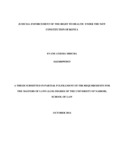Judicial enforcement of the right to health under the new constitution of Kenya
| dc.contributor.author | Mbicha, Evans Ayiema | |
| dc.date.accessioned | 2014-12-10T06:34:18Z | |
| dc.date.available | 2014-12-10T06:34:18Z | |
| dc.date.issued | 2014 | |
| dc.identifier.citation | Master of Laws (LLM) | en_US |
| dc.identifier.uri | http://hdl.handle.net/11295/77025 | |
| dc.description.abstract | The right to health is a fundamental human right recognized under international human rights law. The recognition of the right to health aims at protecting the most vulnerable in the society. Proper health care is needed for the survival of the human being. Its recognition is an essential component of development, vital to a nation's economic growth and internal stability. The 2010 Constitution of Kenya (CoK) has for the first time recognized socio-economic rights under Article 43. The right to health has also been recognized together with other socioeconomic rights. The High Court of Kenya has been granted the authority to uphold and enforce the bill of rights. Despite its recognition in the CoK judicial enforcement of the right to health has faced numerous challenges. Some of the key challenges include the normative interpretation of the right to health and the choice between the minimum content core approach developed by Committee on Economic, Social and Cultural Rights (CESCR) and the reasonableness test approach developed by the South African Constitutional Court; the balancing between making decision that touch on allocation of resources and respecting the doctrine of separation of powers; and finally drafting an appropriate remedy when the right to health has been infringed and how to monitor the implementation. Kenyan Court has had to grapple with these challenges in adjudicating the right to health. This research analyses the constitutional protection of the right to health in Kenya. It interrogates the key decisions that have been made in regard to the judicial enforcement of the right to health and other key socio-economic rights under article 43 of CoK. It discusses the key practical challenges that the courts face in enforcing the right to health. Finally it discusses recommendations upon which if integrated will promote the judicial enforcement of the right to health. This study aims at providing scholarly literature on the judicial enforcement of the right to health in Kenya. This literature through the recommendations addressed will provide the Kenyan courts with a guide to follow when addressing the practical challenges facing the adjudication of the right to health. It also proposes adoption of the minimum core content approach to ensure citizens access the basic essential of health services in Kenya. | en_US |
| dc.language.iso | en | en_US |
| dc.publisher | University of Nairobi | en_US |
| dc.title | Judicial enforcement of the right to health under the new constitution of Kenya | en_US |
| dc.type | Thesis | en_US |
| dc.type.material | en_US | en_US |

